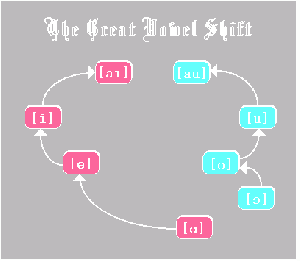Great Vowel Shift
The Great Vowel Shift is a phonetic shift in the English language which separates the Middle English era from the Early Modern English era, or the general Modern English era.
Contents
Time Period
The Great Vowel Shift happened sometime in the 15th century. It was a gradual change which have many possible causes, although no one is accepted as truth. Although there were lingering shifts continuing up until the 19th century, as well as other shifts in America and other countries.
Possible Reasons
Simplified Version of the Shift
| Vowels | ||||||||||
|---|---|---|---|---|---|---|---|---|---|---|
| Front | Central | Back | ||||||||
| Unround | Unrounded | Rounded | ||||||||
| High | iː - ɪ | uː - ʊ | ||||||||
| Mid | eː - ɛ | ə/ʌ | oː - ɔ | |||||||
| Low | æ | aː/a | ||||||||
| All entries are: Tense - Lax | ||||||||||
The shift involves most long and tense vowels to basically "move up" or become diphthongised. This would mean that /aː/ shifted up to /eː/, and /eː/ shifted up to /iː/, and /iː/ being already at the top, became the diphthong /aj/. On the other side, /oː/ shifted to /uː/, and /uː/ become the diphthong /aw/. If the /uː/ did not originally have two syllables, it became /ʌ/, and likewise many /a/ sounds had shifted to /æ/ in monosyllabic endings.
The shift is as follows:
| Front | Central | Back | |
|---|---|---|---|
| Diphthong | aj | aw | |
| High | ↑ i |
↑ u | |
| Mid | ↑ e |
↑ o | |
| Low | ↑ æ |
← a |
